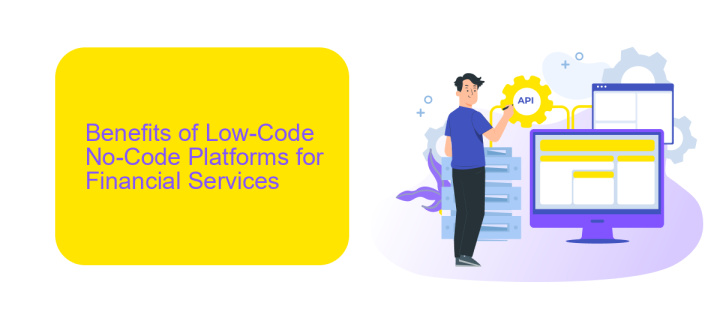Low-Code No-Code Platforms Financial Services
Low-Code No-Code (LCNC) platforms are revolutionizing the financial services industry by enabling rapid application development with minimal coding expertise. These platforms empower financial institutions to streamline processes, enhance customer experiences, and reduce operational costs. By democratizing technology, LCNC platforms facilitate innovation and agility, allowing financial services to swiftly adapt to ever-changing market demands and regulatory requirements.
Introduction
In the rapidly evolving financial services industry, Low-Code No-Code (LCNC) platforms are revolutionizing the way organizations develop and deploy applications. These platforms enable financial institutions to create robust, scalable solutions without the need for extensive coding expertise, significantly reducing development time and costs.
- Accelerated application development and deployment
- Cost-effective solutions with reduced need for specialized IT staff
- Enhanced flexibility and scalability to meet changing business needs
- Improved integration capabilities with existing systems
One of the key advantages of LCNC platforms is their ability to seamlessly integrate with various third-party services, streamlining workflows and enhancing operational efficiency. For instance, platforms like ApiX-Drive facilitate easy integration between different applications, allowing financial institutions to automate processes and improve data accuracy. By leveraging LCNC platforms, financial services can stay competitive in a fast-paced market while delivering superior customer experiences.
Benefits of Low-Code No-Code Platforms for Financial Services

Low-code and no-code platforms offer significant advantages for financial services by enabling rapid application development with minimal coding expertise. These platforms empower financial institutions to quickly adapt to market changes and regulatory requirements, enhancing their agility and competitiveness. By reducing the dependency on traditional software development, financial firms can streamline their operations, reduce costs, and accelerate time-to-market for new products and services.
Moreover, low-code and no-code platforms facilitate seamless integration with existing systems and third-party services. For instance, ApiX-Drive allows financial institutions to easily connect various applications and automate workflows without extensive technical knowledge. This capability ensures that data flows smoothly between different systems, improving operational efficiency and decision-making. Ultimately, leveraging these platforms helps financial services providers to innovate faster, improve customer experiences, and maintain a competitive edge in a rapidly evolving industry.
Implementation Strategies

Implementing Low-Code No-Code platforms in financial services requires a strategic approach to ensure seamless integration and maximum efficiency. The first step involves identifying the core business processes that can benefit the most from automation and simplification. This includes areas like customer onboarding, loan processing, and compliance management.
- Assess the current systems and workflows to determine integration points.
- Select a reliable Low-Code No-Code platform that aligns with your business objectives.
- Leverage integration services like ApiX-Drive to connect disparate systems effortlessly.
- Conduct pilot projects to test the platform's capabilities and gather feedback.
- Train staff and stakeholders on the new system to ensure smooth adoption.
By following these steps, financial institutions can significantly reduce development time and costs while enhancing operational efficiency. Utilizing integration services such as ApiX-Drive can simplify the process of connecting various applications, ensuring that data flows seamlessly across the organization. This strategic approach not only accelerates digital transformation but also positions the institution for future growth and innovation.
Case Studies and Success Stories

Low-code and no-code platforms have revolutionized the financial services industry by enabling rapid development and deployment of applications. One notable example is a leading bank that utilized these platforms to streamline their loan approval process, reducing the time from weeks to mere days.
Another success story involves a fintech startup that leveraged low-code solutions to quickly adapt to regulatory changes. By using these platforms, they were able to implement necessary compliance measures without extensive coding, saving both time and resources.
- A major insurance company used a no-code platform to create a customer self-service portal, significantly improving customer satisfaction and reducing operational costs.
- An investment firm integrated ApiX-Drive to automate data transfer between their CRM and financial analysis tools, enhancing data accuracy and operational efficiency.
- A credit union adopted low-code tools to develop a mobile app for account management, attracting a younger demographic and increasing user engagement.
These case studies highlight the transformative impact of low-code and no-code platforms in financial services. By enabling rapid development, seamless integration, and enhanced compliance, these platforms are empowering financial institutions to stay competitive in a fast-evolving market.
Future Trends and Outlook
As the financial services industry continues to evolve, Low-Code No-Code (LCNC) platforms are expected to play a pivotal role in driving innovation and efficiency. The future will likely see an increased adoption of these platforms, enabling financial institutions to rapidly develop and deploy applications without the need for extensive coding expertise. This shift will not only reduce development costs but also accelerate time-to-market, allowing firms to stay competitive in a fast-paced environment.
Moreover, the integration of LCNC platforms with other technologies such as artificial intelligence and machine learning will further enhance their capabilities. Services like ApiX-Drive, which facilitate seamless integration between various applications, will become increasingly important. By simplifying the process of connecting disparate systems, these services will enable financial institutions to create more cohesive and responsive digital ecosystems. As a result, the industry can expect to see more personalized and efficient financial services, driven by the power of LCNC platforms and advanced integration tools.
FAQ
What are Low-Code and No-Code platforms?
How can Low-Code and No-Code platforms benefit financial services?
Are Low-Code and No-Code platforms secure enough for financial applications?
Can Low-Code and No-Code platforms integrate with existing financial systems?
What are the limitations of using Low-Code and No-Code platforms in financial services?
Do you want to achieve your goals in business, career and life faster and better? Do it with ApiX-Drive – a tool that will remove a significant part of the routine from workflows and free up additional time to achieve your goals. Test the capabilities of Apix-Drive for free – see for yourself the effectiveness of the tool.

